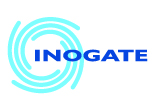INOGATE: Difference between revisions
→See also: Energy Charter Treaty |
|||
| Line 59: | Line 59: | ||
* [[Energy Community]] |
* [[Energy Community]] |
||
* [[Energy policy of the European Union]] |
* [[Energy policy of the European Union]] |
||
* [[Energy Charter Treaty]] |
|||
==References== |
==References== |
||
Revision as of 13:22, 1 October 2010

INOGATE is an international energy co-operation programme between the European Union (EU), Turkey and countries of the NIS, with the exceptions of the Baltic States and the Russian Federation. Formally it describes itself as supporting "international cooperation between the European Union, the littoral states of the Black & Caspian Seas and their neighbouring countries".[1] It is assisted, via the EU's EuropeAid programme, by a secretariat based in Kiev, Ukraine, with a regional office in Tbilisi, Georgia.
INOGATE originated in 1995 as an EU support mechanism dealing with INterstate Oil and GAs Transportation to Europe (whence it derived its name as an acronym).[2] It was particularly concerned initially with oil and gas pipelines running from and through Eastern Europe and the Caucasus to the EU. Following a conference in Baku, Azerbaijan in 2004 and a conference in Astana, Kazakhstan it has since evolved into a broader energy partnership, concentrating on four key topics:
- enhancing energy security
- convergence of member state energy markets on the basis of EU internal energy market principles
- supporting sustainable energy development
- attracting investment for energy projects of common and regional interest
Since 2007, the INOGATE programme has been financed by the European Neighborhood Programme Initiative (ENPI).
INOGATE partner countries
The INOGATE partner countries are:
Turkey is an INOGATE Partner Country and is, therefore, regularly invited to attend INOGATE meetings but it is not a beneficiary country. The INOGATE programme is a joint initiative of three directorates of the European Commission: the Directorate-General for Transport & Energy; the Directorate-General for External Relations; and the EuropeAid Cooperation Office.
The Baku Initiative and the Astana Declaration
The Baku Initiative resulted from a policy dialogue on energy cooperation between the European Union and the INOGATE partner countries. The initiative was announced on 13 November 2004 at the Energy Ministerial Conference in Baku. A second Ministerial Conference was held in Astana on 30 November 2006 which confirmed the broader remit of the INOGATE programme to cover a range of energy issues in the Partner Countries and their cooperation in these issues with the EU.
One objective of the Baku Initiative is to enhance integration of the energy markets of participating countries with the EU energy market, so as to create transparent energy markets, capable of attracting investment and enhancing security of energy supply. (Other aspects of the Initiative were concerned with transport issues: see main article). The partner countries agreed objectives to harmonise legal and technical standards so as to create a functioning integrated energy market in accordance with EU and international legal and regulatory frameworks; to increase the safety and security of energy supplies by extending and modernising existing infrastructure, substituting outdated power generation infrastructures with environmentally-friendly systems; the development of new infrastructures and implementation of modern monitoring systems; improvement of energy supply and demand management through the integration of efficient and sustainable energy systems; and promotion of the financing of commercially and environmentally viable energy projects of common interest. A 'road-map' towards achievement of these and allied objectives was adopted at the Astana Ministerial Conference.
Structure and Activities
The coordinating body of the Baku Initiative is the INOGATE Technical Secretariat, which is located in Kiev.
The Baku Initiative is implemented through the four working groups, each of which contains members from all partner countries:
- Harmonisation of Legal, Regulatory and Institutional framework for market liberalisation
- Enhancing Safety and Security of Energy Transportation Networks
- Sustainable development
- Investment Attraction and Project Facilitation
A number of specific projects, financed by the ENPI, are associated with the INOGATE programme, and are listed at the INOGATE webportal. As at February 2009, these projects included initiatives to improve safety and security of oil and gas transit structures, to develop coordinated national energy policies in Central Asia, and to support market integration and sustainable energy initiatives in partner countries.
INOGATE has also prepared detailed maps of oil and gas pipelines in partner countries and their links to Western Europe.
The INOGATE programme has an ongoing schedule of conferences and publications. Its webportal contains regularly updated information and news on energy developments in partner countries and relevant EU initiatives and policies.
See also
References
External links
- INOGATE web site
- Baku Initiative European Commission DG Transport and Energy
- Ministerial Declaration on Enhanced energy co-operation between the EU, the Littoral States of the Black and Caspian Seas and their neighbouring countries, 30 November 2006, Astana
- Energy economics
- Energy policies and initiatives of the European Union
- International energy organizations
- European Commission projects
- Energy in Azerbaijan
- Energy in Armenia
- Energy in Georgia (country)
- Energy in Kazakhstan
- Energy in Kyrgyzstan
- Energy in Moldova
- Energy in Tajikistan
- Energy in Uzbekistan
- Energy in Turkey
- Energy in Turkmenistan
- Energy in Ukraine
- Third country relationships with the European Union
- Alternative energy
- Sustainable energy
- Energy security
